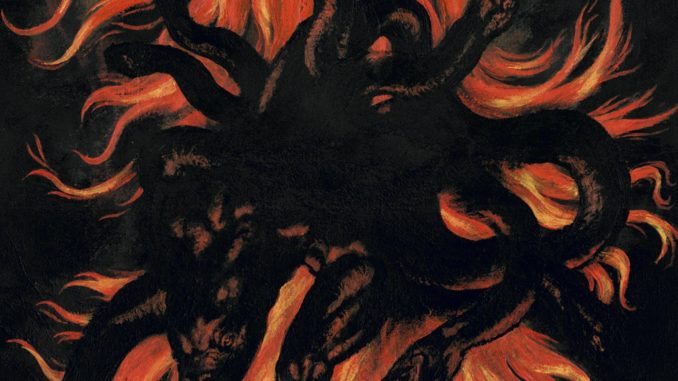
It is difficult to begin the review of an album so highly anticipated and tremendous in what it had to accomplish. The conclusion of Deathspell Omega’s eclectic and monumental trilogy, Paracletus had some big shoes to fill, as 2004’s Si Monumentum, a grandiose black metal epic, and 2007’s Fas, a mysterious and technical giant, were entirely dissimilar but fantastic albums in their own right. Keeping in mind this progression, the expected sound of Paracletus was shrouded in complete mystery. Where would they go next? Also, given the nature of Fas, whose complex song structures took me a few years to fully appreciate, I expected that Deathspell Omega’s musical output would necessitate patience. I therefore vowed not to dip my pen in the ink until I had given Paracletus a thorough evaluation. Currently, it has been digested over thirty times and as expected, Paracletus demanded the meticulous, repeated listens in order to fully appreciate it. I can now safely say that this album continues Deathspell Omega’s musical evolution and is a stunning finale to their trilogy.
The magnificence of Deathspell’s music lies most significantly in their avant-garde emotive riffing style that they started with the EP, Kenose. Taking the wall-of-sound, atmospheric intentions of black metal’s characteristic tremolo riffing a step further, Deathspell Omega fully realizes the potential of the guitar’s ability to convey emotions in metal music. Just consider the shivering guitars midway through “Have you Beheld the Fevers?,” the strained and ominous riff that closes “Abcission,” and the warped “drifting off” sound that opens “Devouring Famine.” They are painful and yet Deathspell Omega makes these perverse moments glorious.
My god, does this album blur the line between rottenness and beauty. Like Fas, the music alternates between cleaner, more sparse sections (“Dearth,” for example) before descending into chaotic moments of technical fury. The bass is so damn gnarly and powerful too, adding to a noticeably dirtier sound that almost calls to mind their pre-Si-Monumentum days. The drumming is as dynamic as ever too, ranging from a sort of ritualistic palpitation in the album’s intro and “Epiklesis II” to break-neck blasting, most noticeable in the juxtaposition between the schizophrenic sputtering drums and the casual meandering riff during the introduction to “Abscission.” Mikko Aspa (and some other unknown vocalist, possibly Hasjarl?) narrate over the madness, occasionally alining a well-placed scream in rhythm with the music. The screams this time around have turned more maniacal, oftentimes becoming a near-primal yowl. The mental breakdown in “Phosphene” is the most notable example, when the guitars become an electronic mess as the vocalist lets out his disturbed shriek.
I think part of the reason that this album is so commendable is its presentation of man’s common existential issues. Its inverting of traditional Christian imagery, glorifying all that is perverse in the process, provides interesting philosophical questions (at least to me). Can we find “god” and the true nature of humans through the devil? Can the line between that which we find pleasing and appalling be blurred? For example in “Abscission”:
It is by no means possible to separate them
The den of serpents, the knot of vipers corruption-bred
And the blazing spirit of the mystic heaven above
Perhaps they are one in the same… Likewise, the music matches this struggle, contorting itself in the most disgusting ways. Yet, somehow, these seemingly repulsive moments of the album are those that I find the most alluring. It is in these instances, that the above questions are sonically addressed and affirmed. Shouldn’t I be turned off by this lack of traditional song structures, its loudness, the screaming, and the sickening sounds produced by the guitars? But rather, I crave it all the more.
What makes Paracletus so frustrating though, is that listening to other artists, even the ones who put out great albums, becomes an impossibility. When I feel that I should stop for fear of over-listening, the alternative choice presented, that of playing any other album in my library, just seems to be a worse option. I believe that this is partly due to a theory I hold about Deathspell Omega’s music. This must be how Venom sounded to people in the early 80s, or how the first Norwegian black metal bands of the 90s were heard. I feel as though I’m listening to something completely fresh and innovative, completely sidestepping all clichés and obliterating any expectations. Deathspell Omega have created their own genre of music, one that pushes black metal and more broadly, extreme metal forward to previously uncharted territory.
Deathspell Omega’s trilogy stands amongst the greatest music I’ve ever heard. This is art that is so far ahead of most metal bands out there today. While many artists, even the ones who put out fine albums every year, are still content to stay within the confines of specific genre restrictions, it becomes all the more satisfying to experience Deathspell Omega who continue to surprise, forging their own solitary path as a band that is so utterly unique and forward-thinking. The last words spoken on the album are: “You were seeking strength, justice, splendour! You were seeking love! Here is the pit, here is your pit! Its name is SILENCE…” I hope that these words aren’t referring to the fans of Deathspell Omega craving more music. After this startling climax to their trilogy, silence is the last thing I desire from Deathspell Omega.
-Maxwell Rock
VITALS:
Release: 08.11.2010
Label: Norma Evangelion Diaboli/Season Of Mist
Avantgenre: Peerless Extreme Metal
Duration: 42:34
Origin: France
Official site: None
Review online since: 26.11.2010 / 21:47:56
| TRACKLIST:
01 – Epiklesis I |

Leave a Reply